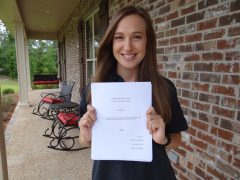Southern Register: Class of 2020

Southern Studies Students Earn Degrees and Awards
Despite the strange way the semester ended, Southern Studies students worked hard, even through a pandemic.
May 9 was the official graduation date for three undergraduate majors and five graduate students, who either earned their MA or MFA degrees. Several of those students also earned Southern Studies Awards.
Olivia Terenzio, the Southern Foodways Alliance Nathalie Dupree Graduate Fellow, was the first remote thesis defender on April 16 for her master’s thesis, “Feijoada and Hoppin’ John: Foodways, Collective Identity, and Belonging in Brazil and the American South.”
Her research efforts earned her the Lucille and Motee Daniels Award for outstanding thesis, which compares two African-derived dishes—feijoada in Brazil, and Hoppin’ John in the United States —and how each has been used to construct national, ethnic, and regional identity narratives within these two societies of the Americas.
Terenzio, who also received the College of Liberal Arts Outstanding Graduate Student in Southern Studies Award, became interested in the subject of rice and beans after spending a few months in Brazil in 2018 and observing differences in collective identity narratives between Brazil and the US South, where she grew up.
On April 17, Hilary Word defended her thesis “Post-Soul Speculation: An Exploration of Afro-Southern Speculative Fiction,” which looks at the genre of fiction that encompasses works where the setting involves supernatural, futuristic, or other imagined elements.
Word, who considered the supernatural and futuristic worlds through the lens of literature, said she was thrilled to learn she earned the Sue Hart Prize for outstanding paper in gender studies.
“I’m honestly still in shock; I had no idea that I was even being considered,” Word said. “Just the recognition is amazing, but then to top it off with an actual prize is really incredible. “I feel so humbled and so grateful that my work has been recognized in this way. It’s truly an honor.”
April 20 was a big day for James G. Thomas, Jr., when he defended his thesis in preparation for earning his third degree from the University of Mississippi, this time a Master of Fine Arts in Documentary Expression.
Thomas began his research on the history of Lebanese communities in the Mississippi Delta in 2006, when he was working on his master’s degree in Southern Studies. That effort turned into his master’s thesis, and he expanding on that same topic for his MFA.
“The Lebanese in Mississippi: An Oral History,” is a project that “documents and interprets the lives of first- and subsequent-generation Lebanese Mississippians whose families immigrated to the state looking for a better life.” Thomas has built an extensive online oral history documentary project that includes audio portions of oral history interviews, narrator biographies, photographs and documents shared by those narrators, a history of Syrian-Lebanese migration to the state, and a four-part audio documentary.
After graduating with his MA in Southern Studies in 2019, Hooper Schultz decided to remain at the University of Mississippi for another year and earn his M.F.A. in Documentary Expression. On April 28 he defended his thesis “The Southern Front: Gay Liberation Activists in the US South and Public History through Audiovisual Exhibition.”
Schultz conducted oral histories through a series of face-to-face interviews across the Southeast over the course of three years and said he learned so much since the Carolina Gay Association and Southeastern Gay Conferences have been written about and studied very little up until now.
He is continuing his education at the University of North Carolina at Chapel Hill as a doctoral student in history.

Zaire Love finished her MFA film and defended her thesis April 28. She won the Ann Abadie Prize for best documentary project with “The Black Men I Know,” which follows an uncle and nephew whose neighborhood in Memphis “introduced and inducted them into violence, incarceration, and hustle.” It is a creative documentary using experimental elements to tell their story; an “honest attempt to explore the depth of emotional suppression in black men because of grief, the manifestations of grief, and how these manifestations also affect the ones these black men love the most, their families.”
On May 18th, her film “Soulfed,” made its TV debut on WKNO in Memphis.
The other graduate student to win an award is Christian Leus, who won the Lucille and Motee Daniels Award for outstanding paper by a first-year graduate student. Her paper, “Reporting and Creating Violence: Press Coverage of a 1930s Murder” was written for SST 602, taught by Ted Ownby.
This year, four undergraduate students were recognized for their impressive writing abilities.

Claire Bonvillain won the Gray Award for her outstanding undergraduate paper, “‘Working Men in a Wild Place’: An Environmental History of Houma, Louisiana” for Jay Watson’s ENG 458 Southern Environmental Literature course, where students wrote environmental histories of their hometowns.
“I chose to write about Houma, where I was born—although I didn’t grow up there—because I knew that Houma’s people are very connected to the environment both recreationally and for their livelihoods, through activities such as fishing, crabbing and shrimping,” said Bonvillain, who was also a UM Taylor Medalist. “South Louisiana is also impacted by environmental events like hurricanes and flooding, and has been affected by environmental damage such as oil spills. I thought that it would make for a really interesting paper to explore all of these factors, and I also wanted to learn more about the place where my family is from. Even knowing these things about Houma, I wasn’t prepared for how much I would learn.”
Bonvillain, who graduated from the Sally McDonnell Barksdale Honors College with an English degree, said her favorite part of writing the paper was interviewing family members, but she never expected her work would earn her an award.
“I learned a lot about their lives and their experiences with environmental change, and it was really cool to get to talk to them about their hometown,” she said.
Addie Paige Pratt, a freshman from Corinth in the Sally McDonnell Barksdale Honors College majoring in integrated marketing communications, won the Sarah Dixon Pegues Award for outstanding paper in music for her original musical composition and paper, “In Honor of Ida B. Wells and Her Legacy: ‘Colorblind,’” written for the Honors section of SST 101 with Jodi Skipper.
Pratt said she wanted to do something creative for her final project combining her love of songwriting and music.

“I thought it would be really interesting to compose a song honoring Wells’s legacy and reference some of the experiences that influenced her writing,” Pratt said. “I actually sat down to write the song immediately after the idea came to mind, and I finished it in about thirty minutes. The title of the song, “Colorblind,” is such an important message, because it is a metaphor for a racist mind perceiving the world and it’s people as only black and white, when in reality, everyone is a part of a hugely complex makeup of humanity. The color of our skin certainly should not be used as a catalyst for judgment and hate.”
William Nieman won the Peter Aschoff Award for outstanding paper in music for his honors thesis, “Country Fun: A Cultural History of Opryland, USA, Nashville, and the Suburban South,” directed by Ted Ownby.
Nieman, who double majored in Southern Studies and English in the Sally McDonnell Barksdale Honors College, was also awarded a Taylor Medal this spring.
His thesis was informed by research he did for two months last summer as in intern at the Country Music Hall of Fame and Museum in Nashville, Tennessee. His research was funded by the Julian and Kathryn Wiener Endowment through the Center for the Study of Southern Culture.
“It’s where I did the research that allowed me to change my topic and where I had conversations with some of my co-workers that impacted how I thought about country music,” Neiman said. “I’m also surprised how much of the thesis was about Nashville itself, and my time at the Hall of Fame definitely allowed me to get a glimpse of what life in the city is like.”

Rachel Winstead won the Coterie Award for outstanding undergraduate paper for “Basements Below the Sanctuary: A Story of the Church School,” which was her honors thesis, directed by Ralph Eubanks.
Winstead also double majored in Southern Studies and English as a member of the Sally McDonnell Barksdale Honors College.
Winstead, a native of Hattiesburg, said her Southern Studies courses taught her how the stories of the past constantly influence the present.
“When I took a southern literature class, I was amazed by the stories of southern authors,” Winstead said. “For the first time, I understood the literature I was reading on a personal level. Through southern literature, I gained a new lens to see my place and myself within the larger world. I gained a deeper understanding of people by studying the place I grew up.”
Written By Rebecca Lauck Cleary
